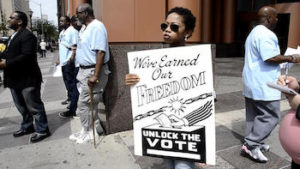
*Elections in America are held in November, and this date’s Registry looks at the National voter suppression in Black America.
As of 2024, more than 4 million African American felons cannot vote on election day in the United States, even though they have served their prison time for a past felony conviction. That’s more than the combined census of every Black male and female living in Atlanta, Cleveland, Boston, Miami, Phoenix, St. Louis, and Kansas City, Missouri; Richmond, Virginia; Pittsburgh, Pennsylvania; Louisville, Kentucky; and San Diego and Sacramento, California.
Furthermore, if all disenfranchised former felons are included, the total number is 3.9 million. That assemblage living in one geographical area would comprise America’s second-largest city. If they formed a state, they would be the 27th largest.
The number of inmates in communities is about 630,000 annually, released from state and federal prisons back into society. Many say that taking away their right to vote after serving time amounts to prison after prison. Former Richmond, Virginia, City Councilman Chuck Richardson is an example. A Vietnam War veteran with a past heroin addiction, he served two years in jail and prison for the distribution and on a contempt-of-court charge for refusing to identify heroin suppliers. He was released five years ago but has been on probation for 15 and 20 years. A former Marine with two Purple Hearts and a Vietnamese Cross of Gallantry is drug-free.
After 18 years of city council experience, he is a consultant to a Black business contracting group and has founded the National Organization for Rehabilitated Offenders. Richardson cannot use his civic responsibilities of voting today. Virginia Gov. Mark Warner, a Democrat, has made it much easier for ex-felons to regain their voting rights in Virginia, where one in every four Black men cannot vote because of a felony conviction. The governor reduced a 13-page application to one page and reduced all waiting periods for nonviolent offenders from as many as seven years to three years after completing probation or parole. His efforts have restored more individuals’ rights in the first eight-and-a-half months of this administration than the previous three governors combined in their first years. But most governors, Democrats, and Republicans do not support ex-felons voting.
Only two states have no limitations on voting rights for convicted felons: Maine and Vermont. According to the Sentencing Project, a non-profit organization that promotes alternatives to incarceration, all others impose varying restrictions. The Sentencing Project reports that fourteen states permanently deny felons the right to vote unless they apply for their rights through a gubernatorial pardon or other administrative procedures. Twelve states automatically restore the right to vote at the end of incarceration. Thirty-two states prohibit felons from voting while on parole, and 28 of those also prohibit felons from voting while on probation. The demand for voting rights for convicted felons could expand into a considerable civil rights movement if supporters for felony voting rights have their way.
One person spearheading this movement is the Rev. Timothy McDonald, pastor of Atlanta’s First Iconium Baptist Church and president of the People for the American Way’s National African American Ministers Leadership Council. Conversely, conservative groups, such as the Heritage Foundation and the Center for Equal Opportunity, oppose giving full voting rights to former felons. Todd Gaziano, director of legal studies for the Heritage Foundation, says this about voting. “There are critical resource decisions: whether to keep this police chief, get rid of the mayor, or post police officers at the schools. There are dozens of decisions like this that come up every year that I believe only citizens and only citizens in good standing should make.” Some legal researchers observe that historically, race has been and is a factor.
Andrew Shapiro, a research fellow at Harvard Law School, in his article, “The Disenfranchisement,” published in “The American Prospect” magazine, writes, “During the Reconstruction Era in the South, disenfranchisement provisions were often tailored so that their effect would be to exclude mostly, or only, Blacks,” “Looking for ways to disqualify blacks [from voting] without running afoul of the newly ratified Fifteenth Amendment, which prohibited blatant exclusion on racial grounds, these legislators adopted a host of ostensibly neutral voting barriers to achieving their desired end. In addition to adopting discriminatory literacy tests and poll taxes, they rewrote their felon disenfranchisement laws to disqualify blacks subtly.” Even with the 1965 Voting Rights Act signed into law, African Americans are still being kept from voting.
Florida (alone) has disenfranchised 647,100 people, more than any other state. Nearly a third of them are Black men. Texas has the second-highest number of disenfranchised former felons, with 610,000. One-quarter of those are Black Americans. What is the solution? Dianne M. Pinderhughes, a political science professor at the University of Illinois at Urbana, and Brett Dignam, a Yale University law professor, say pressure could be put on Congress in 2007 when Section 5 of the Voting Rights Act is set for evaluation and a decision on its renewal. That section decides whether states with a history of discrimination need continued federal oversight on voting matters. Another alternative to closing this election gap is filing a class-action suit.
Findings:
The late Rep. John Conyers Jr. (D-Michigan) introduced several bills that address allowing convicted felons to vote in federal elections. If you are qualified to vote in any election, by all means, do so!